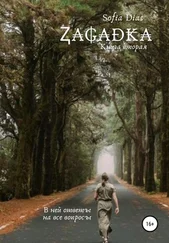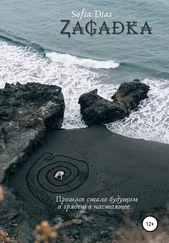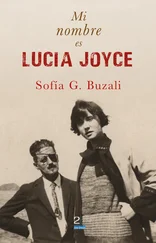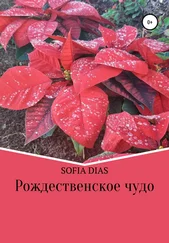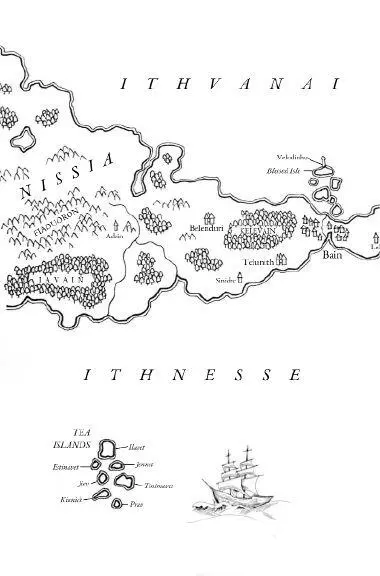
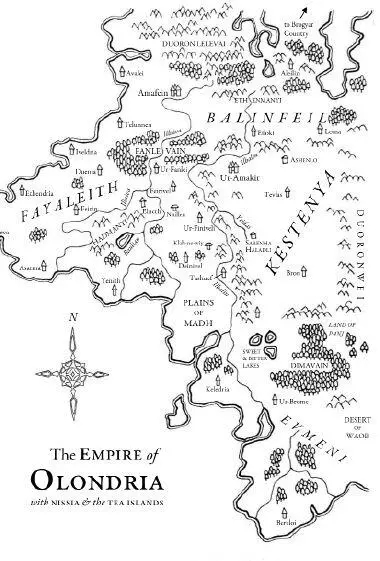
Book One
The Wind of Miracles
Chapter One
Childhood in Tyom
As I was a stranger in Olondria, I knew nothing of the splendor of its coasts, nor of Bain, the Harbor City, whose lights and colors spill into the ocean like a cataract of roses. I did not know the vastness of the spice markets of Bain, where the merchants are delirious with scents, I had never seen the morning mists adrift above the surface of the green Illoun, of which the poets sing; I had never seen a woman with gems in her hair, nor observed the copper glinting of the domes, nor stood upon the melancholy beaches of the south while the wind brought in the sadness from the sea. Deep within the Fayaleith, the Country of the Wines, the clarity of light can stop the heart: it is the light the local people call “the breath of angels” and is said to cure heartsickness and bad lungs. Beyond this is the Balinfeil, where, in the winter months, the people wear caps of white squirrel fur, and in the summer months the goddess Love is said to walk and the earth is carpeted with almond blossom. But of all this I knew nothing. I knew only of the island where my mother oiled her hair in the glow of a rush candle, and terrified me with stories of the Ghost with No Liver, whose sandals slap when he walks because he has his feet on backwards.
My name is Jevick. I come from the blue and hazy village of Tyom, on the western side of Tinimavet in the Tea Islands. From Tyom, high on the cliffs, one can sometimes see the green coast of Jiev, if the sky is very clear; but when it rains, and all the light is drowned in heavy clouds, it is the loneliest village in the world. It is a three-day journey to Pitot, the nearest village, riding on one of the donkeys of the islands, and to travel to the port of Dinivolim in the north requires at least a fortnight in the draining heat. In Tyom, in an open court, stands my father’s house, a lofty building made of yellow stone, with a great arched entryway adorned with hanging plants, a flat roof, and nine shuttered rooms. And nearby, outside the village, in a valley drenched with rain, where the brown donkeys weep with exhaustion, where the flowers melt away and are lost in the heat, my father had his spacious pepper farm.
This farm was the source of my father’s wealth and enabled him to keep the stately house, to maintain his position on the village council, and carry a staff decorated with red dye. The pepper bushes, voluptuous and green under the haze, spoke of riches with their moist and pungent breath; my father used to rub the dried corns between his fingers to give his fingertips the smell of gold. But if he was wealthy in some respects, he was poor in others: there were only two children in our house, and the years after my birth passed without hope of another, a misfortune generally blamed on the god of elephants. My mother said the elephant god was jealous and resented our father’s splendid house and fertile lands; but I knew that it was whispered in the village that my father had sold his unborn children to the god. I had seen people passing the house nudge one another and say, “He paid seven babies for that palace”; and sometimes our laborers sang a vicious work song: “ Here the earth is full of little bones .” Whatever the reason, my father’s first wife had never conceived at all, while the second wife, my mother, bore only two children: my elder brother Jom, and myself. Because the first wife had no child, it was she whom we always addressed as Mother, or else with the term of respect, eti-donvati , “My Father’s Wife”; it was she who accompanied us to festivals, prim and disdainful, her hair in two black coils above her ears. Our real mother lived in our room with us, and my father and his wife called her “Nursemaid,” and we children called her simply by the name she had borne from girlhood: Kiavet, which means Needle. She was round-faced and lovely, and wore no shoes. Her hair hung loose down her back. At night she told us stories while she oiled her hair and tickled us with a gull’s feather.
Our father’s wife reserved for herself the duty of inspecting us before we were sent to our father each morning. She had merciless fingers and pried into our ears and mouths in her search for imperfections; she pulled the drawstrings of our trousers cruelly tight and slicked our hair down with her saliva. Her long face wore an expression of controlled rage, her body had an air of defeat, she was bitter out of habit, and her spittle in our hair smelled sour, like the bottom of the cistern. I only saw her look happy once: when it became clear that Jom, my meek, smiling elder brother, would never be a man, but would spend his life among the orange trees, imitating the finches.
My earliest memories of the meetings with my father come from the troubled time of this discovery. Released from the proddings of the rancorous first wife, Jom and I would walk into the fragrant courtyard, hand in hand and wearing our identical light trousers, our identical short vests with blue embroidery. The courtyard was cool, crowded with plants in clay pots and shaded by trees. Water stood in a trough by the wall to draw the songbirds. My father sat in a cane chair with his legs stretched out before him, his bare heels turned up like a pair of moons.
We knelt. “Good morning father whom we love with all our hearts, your devoted children greet you,” I mumbled.
“And all our hearts, and all our hearts, and all our hearts,” said Jom, fumbling with the drawstring on his trousers.
My father was silent. We heard the swift flutter of a bird alighting somewhere in the shade trees. Then he said in his bland, heavy voice: “Elder son, your greeting is not correct.”
“And we love him,” Jom said uncertainly. He had knotted one end of the drawstring about his finger. There rose from him, as always, an odor of sleep, greasy hair, and ancient urine.
My father sighed. His chair groaned under him as he leaned forward. He blessed us by touching the tops of our heads, which meant that we could stand and look at him. “Younger son,” he said quietly, “what day is today? And which prayers will be repeated after sundown?”
“It is Tavit, and the prayers are the prayers of maize-meal, passion fruit, and the new moon.”
My father admonished me not to speak so quickly, or people would think I was dishonest; but I saw that he was pleased and felt a swelling of relief in my heart, for my brother and myself. He went on to question me on a variety of subjects: the winds, the attributes of the gods, simple arithmetic, the peoples of the islands, and the delicate art of pepper-growing. I stood tall, threw my shoulders back, and strove to answer promptly, tempering my nervous desire to blurt my words, imitating the slow enunciation of my father, his stern air of a great landowner. He did not ask my brother any questions. Jom stood unnoticed, scuffing his sandals on the flagstones—only sometimes, if there happened to be doves in the courtyard, he would say very softly: “Oo-ooh.” At length my father blessed us again, and we escaped, hand in hand, into the back rooms of the house; and I carried in my mind the image of my father’s narrow eyes: shrewd, cynical, and filled with sadness.
At first, when he saw that Jom could not answer his questions and could not even greet him properly, my father responded with the studied and ponderous rage of a bull elephant.
Читать дальше




